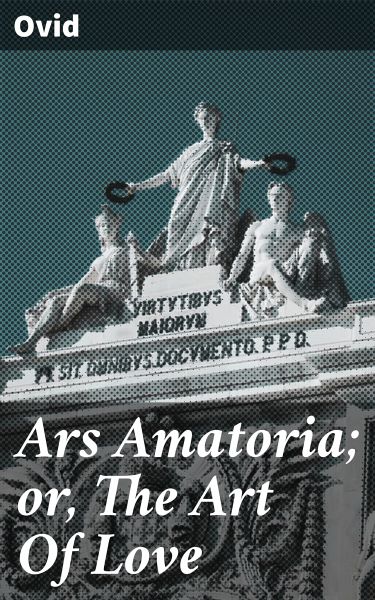
Ars Amatoria; or, The Art Of Love (eBook, ePUB)
Enriched edition. Literally Translated into English Prose, with Copious Notes
Kommentar: Carrington, Zoe / Redaktion: Good Press / Übersetzer: Riley, Henry T.

PAYBACK Punkte
0 °P sammeln!
In "Ars Amatoria; or, The Art of Love," Ovid artfully weaves a playful yet sophisticated guide to love, desire, and seduction. Written in elegiac couplets, this poem stands out for its witty and engaging tone, offering practical advice on wooing both men and women. Set against the backdrop of Rome's hedonistic culture during the reign of Augustus, Ovid's work contrasts social mores with individual desires, embodying the tension between public morality and private passion. The intricacy of his language and the richness of his imagery render a vivid tableau of romantic pursuits while evoking the...
In "Ars Amatoria; or, The Art of Love," Ovid artfully weaves a playful yet sophisticated guide to love, desire, and seduction. Written in elegiac couplets, this poem stands out for its witty and engaging tone, offering practical advice on wooing both men and women. Set against the backdrop of Rome's hedonistic culture during the reign of Augustus, Ovid's work contrasts social mores with individual desires, embodying the tension between public morality and private passion. The intricacy of his language and the richness of his imagery render a vivid tableau of romantic pursuits while evoking the complexities of human relations in a rapidly evolving society. Ovid, a master of Latin literature, was deeply influenced by the cultural and social nuances of his time. His experiences as a poet and witness to the political shifts under Augustus may have spurred him to explore topics of love and sexuality, ultimately allowing him to transgress the boundaries of traditional poetic forms. His vivid imagination and keen observations about human behavior give a personal touch to his work, reflecting both his intellectual legacy and personal encounters. "Ars Amatoria" is not merely a manual for courtship; it is a profound exploration of love's paradoxes and pleasures. Engaging and provocative, this enduring classic invites readers to reflect upon their own romantic inclinations while enjoying Ovid's clever insights and playful narrative. This work is highly recommended for anyone intrigued by love, literature, and the art of seduction. In this enriched edition, we have carefully created added value for your reading experience: - A succinct Introduction situates the work's timeless appeal and themes. - The Synopsis outlines the central plot, highlighting key developments without spoiling critical twists. - A detailed Historical Context immerses you in the era's events and influences that shaped the writing. - An Author Biography reveals milestones in the author's life, illuminating the personal insights behind the text. - A thorough Analysis dissects symbols, motifs, and character arcs to unearth underlying meanings. - Reflection questions prompt you to engage personally with the work's messages, connecting them to modern life. - Hand-picked Memorable Quotes shine a spotlight on moments of literary brilliance. - Interactive footnotes clarify unusual references, historical allusions, and archaic phrases for an effortless, more informed read.
Dieser Download kann aus rechtlichen Gründen nur mit Rechnungsadresse in A, B, BG, CY, CZ, D, DK, EW, E, FIN, F, GR, H, IRL, I, LT, L, LR, M, NL, PL, P, R, S, SLO, SK ausgeliefert werden.













